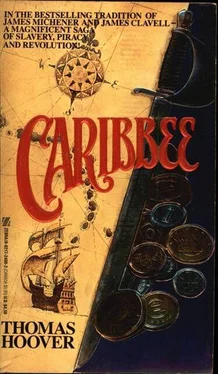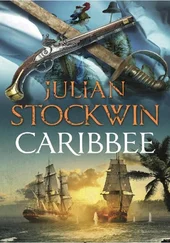Thomas Hoover - Caribbee
Здесь есть возможность читать онлайн «Thomas Hoover - Caribbee» весь текст электронной книги совершенно бесплатно (целиком полную версию без сокращений). В некоторых случаях можно слушать аудио, скачать через торрент в формате fb2 и присутствует краткое содержание. Жанр: Исторические приключения, на английском языке. Описание произведения, (предисловие) а так же отзывы посетителей доступны на портале библиотеки ЛибКат.
- Название:Caribbee
- Автор:
- Жанр:
- Год:неизвестен
- ISBN:нет данных
- Рейтинг книги:3 / 5. Голосов: 1
-
Избранное:Добавить в избранное
- Отзывы:
-
Ваша оценка:
- 60
- 1
- 2
- 3
- 4
- 5
Caribbee: краткое содержание, описание и аннотация
Предлагаем к чтению аннотацию, описание, краткое содержание или предисловие (зависит от того, что написал сам автор книги «Caribbee»). Если вы не нашли необходимую информацию о книге — напишите в комментариях, мы постараемся отыскать её.
Caribbee — читать онлайн бесплатно полную книгу (весь текст) целиком
Ниже представлен текст книги, разбитый по страницам. Система сохранения места последней прочитанной страницы, позволяет с удобством читать онлайн бесплатно книгу «Caribbee», без необходимости каждый раз заново искать на чём Вы остановились. Поставьте закладку, и сможете в любой момент перейти на страницу, на которой закончили чтение.
Интервал:
Закладка:
It is now concluded that, since all English regiments sent against them have failed to subdue these Maroons (who fall upon and kill any who go near their mountain strongholds), efforts must be attempted in another Direction. Accordingly we would instruct the Governor of the Island, Sir Benjamin Briggs, to offer terms of Treaty to their leader, a heathenish Black reported to be called by the name Etiba, whereby each Nation may henceforth exist in Harmony.
The other Condition subverting full English control of the island is the Town that thrives at the Entrance to Jamaica Bay, a place called Cayo de Carena by the Spaniards and now known, in honor of the Restoration of His Majesty, as Port Royal. Said Port scarcely upholds its name, being beholden to none save whom it will. It is home to those Rovers of the sea calling themselves Buccaneers, a willful breed of men formerly of Tortuga, who are without Religion or Loyalty. Travelling whither they choose, they daily wreak depredations upon the shipping of the Spaniard (taking pieces-of-eight in the tens of millions) and have made the Kingdom of the Sea their only allegiance.
Unlike our own Failure to settle prosperous Plantations on Jamaica, this port has enjoyed great Success (of a certain Kind). No city founded in the New World has grown more quickly than this place, nor achieved a like degree of Wealth. It is now more populous than any English town in the Americas save Boston-and it has realized a position of Importance equalled only by its infamous Reputation. In chase of the stolen Spanish riches that daily pour in upon its streets, merchants will pay more for footage along its front than in the heart of London. Having scarce supply of water, its residents do drink mainly strong liquors, and our Census has shown there are not now resident in this Port ten men to every Tippling House, with the greatest number of licenses (we are advisd) having been issued to a certain lewd Woman once of Barbados, who has now repaired thither to the great advancement of her Bawdy Trade.
Although this Port has tarnished the Name of England by its headquartering of these insolent Buccaneers, it is yet doubtful whether the Island would still be in His Majesty's possession were it not for the Fear they strike in the heart of the Spaniards, who would otherwise long since have Reclaimed it.
The chiefest of these Rovers, an Englishman known to all, has wrought much ill upon the Spaniards (and on the Hollanders, during our recent war), for which Service to England (and Himself) he is now conceived by His Majesty as a Gentleman of considerable parts, though he has acted in diverse ways to obstruct our quelling of the island's meddlesome Maroons.
Accordingly, His Majesty has made known to the Council his Desire that we strive to enlist this Buccaneer's good offices in persuading his Rovers (including a notorious Woman, equally well known, said to be his Wife, who doth also sail with these Marauders) to uphold English jurisdiction of the Island and its Port. Should this Design fall out as desir'd, His Majesty has hopes that (by setting, as he would have it privately, these Knights of the Blade in charge of his Purse) he can employ them to good effect.
In furtherance of this end, it is His Majesty's pleasure that we, in this coming year, recall Sir Benjamin Briggs (whose honesty His Majesty has oft thought Problemmatical) and make effort to induce this Buccaneer to assume the post of Governor of Jamaica.
Afterword
In the foregoing I have attempted to distill the wine of history into something more like a brandy, while still retaining as much authentic flavor as possible. Many of the episodes in the novel are fictionalized renderings of actual events, albeit condensed, and the majority of individuals depicted also were drawn from life. The action spans several years, from the first major slave auction on Barbados, thought to have occurred slightly before mid-century, to the English seizure of Jamaica in 1655. The structure of race and economics in England's Caribbean colonies changed dramatically in those short years, a social transformation on a scale quite unlike any other I can recall. The execution of King Charles and the Barbados war of independence also took place during that crucial time.
All documents, letters, and broadsides cited here are essentially verbatim save the two directly involving Hugh Winston. Of the people, there naturally were many more involved than a single novel could encompass. Hugh Winston is a composite of various persons and viewpoints of that age (such as Thomas Tryon), ending of course with the famous buccaneer Sir Henry Morgan, later appointed Governor of Jamaica in recognition of his success pillaging Spanish treasure. Governor Dalby Bedford is a combination of Governor Philip Bell and his successor Francis, Lord Willoughby. (Neither was actually killed in the Barbados revolution. The revolt collapsed when, after defectors had welcomed Parliament's forces ashore, five days of rain immobilized the planters, whereupon a stray English cannon ball knocked down the door of a plantation house where the island's militia commanders were gathered and laid out one of the sentries, demoralizing them into surrender.) Katherine Bedford was inspired by Governor Bell's wife, "in whome by reason of her quick and industrious spirit lay a great stroak of the government." Benjamin Briggs is an embodiment of many early settlers; his installation of the first sugar mill on the island and his construction of a walled compound for protection recall James Drax and Drax Hall, and his later career is not unlike that of Thomas Modyford, a prosperous Barbados planter who later became governor of Jamaica.
Anthony and Jeremy Walrond are vaguely reminiscent of the prominent royalists Humphrey and George Walrond. Edmond Calvert was drawn for some portions of the story from Sir George Ayscue and for others from Admiral William Penn. Richard Morris is a combination of Captain William Morris and General Robert Venables, and James Powlett recalls Vice Admiral Michael Pack. Most of the Council and Assembly members appearing here were actually in those bodies, and my Joan Fuller is homage to a celebrated Bridgetown brothel proprietor of the same name; of them all, I sincerely hope I have done most justice to her memory.
Jacques le Basque was modeled on various early boucaniers-beginning with Pierre le Grand, the first to seize a Spanish ship (using dugouts), and ending with the much-hated French buccaneer-king Le Vasseur, who built Forte de la Roche and its "dovecote." Tibaut de Fontenay was the latter's nephew, who murdered him much as described over the matter of a shared mistress.
Although Serina, as mulatto "bed-warmer" to Benjamin Briggs, had no specific prototype at that early time (a condition soon to change, much to the dismay of English wives at home), Atiba was inspired by a Gold Coast slave named Coffe who led an unsuccessful revolt on Barbados in the seventeenth century, intending to establish a black nation along African lines. As punishment he and several others were ("burned alive, being chained at the stake." When advised of his sentence, he reportedly declared, "If you roast me today, you cannot roast me tomorrow." A contemporary broadside depicting the affair retailed briskly in London. Atiba's subsequent career, as a Maroon leader with whom the English eventually were forced to negotiate, also had various historical models, including the fearsome Cudjoe, head of a warlike nation of free Negroes still terrifying English planters on Jamaica almost eighty years after it was seized.
Very few physical artifacts survive from those years. On Barbados one can see Drax Hall, on which Briggs Hall was closely modeled, and little else. On Tortuga, this writer chopped his way through the jungle and located the site of Le Vasseur's Forte de la Roche and "dovecote." A bit of digging uncovered some stonework of the fort's outer wall, but all that remained of the "dovecote" was a single plaster step, almost three and a half centuries old, once part of its lower staircase and now lodged in the gnarled root of a Banyan tree growing against the huge rock atop which it was built. On Jamaica there seems to be nothing left, save a few relics from the heyday of Port Royal. Only the people of those islands, children of a vast African diaspora, remain as living legacy of Europe's sweet tooth in the seventeenth century.
Читать дальшеИнтервал:
Закладка:
Похожие книги на «Caribbee»
Представляем Вашему вниманию похожие книги на «Caribbee» списком для выбора. Мы отобрали схожую по названию и смыслу литературу в надежде предоставить читателям больше вариантов отыскать новые, интересные, ещё непрочитанные произведения.
Обсуждение, отзывы о книге «Caribbee» и просто собственные мнения читателей. Оставьте ваши комментарии, напишите, что Вы думаете о произведении, его смысле или главных героях. Укажите что конкретно понравилось, а что нет, и почему Вы так считаете.












